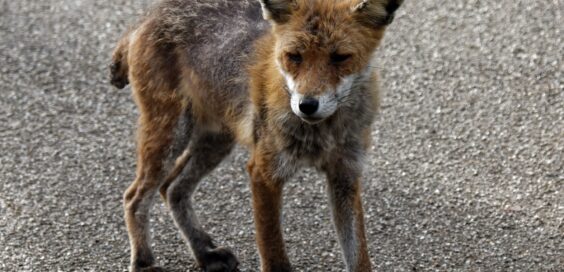
Creature Feature – Mange Threatens Wildlife & Pets
Posted by Dustin Horton // August 15, 2022 // Articles, Creature Feature
Sarcoptic mange is a common, widespread disease in mammals. It is caused by a microscopic mite that burrows into the skin, igniting an immune response. In North America, some of the most commonly affected species include red foxes, gray wolves, coyotes and, more recently, black bears. Mange also threatens our pets.
In addition to tunneling into the skin, mites also deposit eggshells, molted skin and waste, further exacerbating an immune response in the host. Afflicted animals can suffer miserably from intense itching, hair loss, thickening, cracked skin, and sores [photo]. Many eventually die from emaciation, secondary infections or septicemia. Several decades ago, in parts of the U.S. and Canada, humans intentionally introduced sarcoptic mange to coyotes and wolves to control their populations – a cruel and foolish strategy. Since then, mange has spread and is now endemic in several species.
Mange spreads through direct and indirect contact with an infected host or a shared environment; for example, adult foxes can pass mites to their young, or your dog might develop mange after rolling in an area occupied by a diseased animal (sickly wildlife is more likely to seek human spaces). Experts advise against feeding wild animals, which promotes the spread of mange.
The most common medication to treat animals with sarcoptic mange is Ivermectin. While effective, especially when coupled with supportive care, it requires multiple doses and offers abbreviated protection. Fluralaner, the active drug in veterinarian prescribed Bravecto, is very effective, requires just one dose, and provides 2-3 months of protection to help break the reinfestation cycle. Licensed wildlife rescue and rehabilitation specialists perform a valuable community service when they treat wild animals suffering from mange. Consider supporting these unsung heroes with a donation today.
When wildlife begins to appear in areas where pets and people live, it’s crucial to manage interactions carefully. Creating a safe environment for both animals and humans often means guiding wildlife back to appropriate habitats rather than leaving them to wander in spaces where disease can spread. A trusted wildlife removal company can step in to handle these situations professionally, ensuring animals are relocated safely while minimizing stress and risk. By combining secure enclosures, monitored relocation, and habitat restoration, property owners can protect their homes and pets while giving displaced wildlife a chance to thrive in areas suited to their needs. Proper planning and expert intervention create a balance where both humans and animals coexist safely.
Article by Margie Manthey
Photo by Wikimedia Commons













